

The Soul of Man under Socialism. First edition "The Soul of Man under Socialism" is an 1891 essay by Oscar Wilde in which he expounds a libertarian socialist (social anarchist) worldview.[1] The creation of "The Soul of Man" followed Wilde's conversion to anarchist philosophy, following his reading of the works of Peter Kropotkin.[2] In The Soul of Man Wilde argues that, under capitalism, "the majority of people spoil their lives by an unhealthy and exaggerated altruism—are forced, indeed, so to spoil them": instead of realising their true talents, they waste their time solving the social problems caused by capitalism, without taking their common cause away.
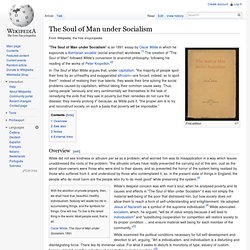
Thus, caring people "seriously and very sentimentally set themselves to the task of remedying the evils that they see in poverty but their remedies do not cure the disease: they merely prolong it" because, as Wilde puts it, "the proper aim is to try and reconstruct society on such a basis that poverty will be impossible.
" Overview[edit] Real freedom. Real freedom is a term coined by the political philosopher and economist Philippe Van Parijs.
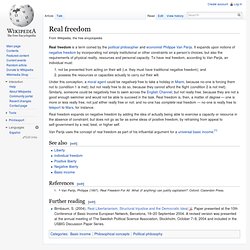
It expands upon notions of negative freedom by incorporating not simply institutional or other constraints on a person's choices, but also the requirements of physical reality, resources and personal capacity. To have real freedom, according to Van Parjis, an individual must: 1. not be prevented from acting on their will (i.e. they must have traditional negative freedom); and 2. possess the resources or capacities actually to carry out their will. Under this conception, a moral agent could be negatively free to take a holiday in Miami, because no-one is forcing them not to (condition 1 is met); but not really free to do so, because they cannot afford the flight (condition 2 is not met). Van Parijs uses the concept of real freedom as part of his influential argument for a universal basic income.[1] See also[edit] References[edit] Jump up ^ Van Parijs, Philippe (1997). Further reading[edit] Classical republicanism. Classical republicanism (also known as civic humanism)[1] is a form of republicanism developed in the Renaissance inspired by the governmental forms and writings of classical antiquity, especially such classical writers as Aristotle, Polybius, and Cicero.
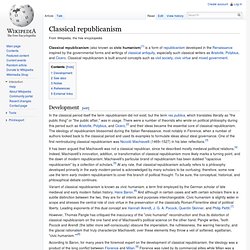
Classical republicanism is built around concepts such as civil society, civic virtue and mixed government. Development[edit] In the classical period itself the term republicanism did not exist, but the term res publica, which translates literally as "the public thing" or "the public affair," was in usage.
There were a number of theorists who wrote on political philosophy during this period such as Aristotle, Polybius, and Cicero,[2] and their ideas became the essential core of classical republicanism. The ideology of republicanism blossomed during the Italian Renaissance, most notably in Florence, when a number of authors looked back to the classical period and used its examples to formulate ideas about ideal governance. Social contract. In moral and political philosophy, the social contract or political contract is a theory or model, originating during the Age of Enlightenment, that typically addresses the questions of the origin of society and the legitimacy of the authority of the state over the individual.[1] Social contract arguments typically posit that individuals have consented, either explicitly or tacitly, to surrender some of their freedoms and submit to the authority of the ruler or magistrate (or to the decision of a majority), in exchange for protection of their remaining rights.
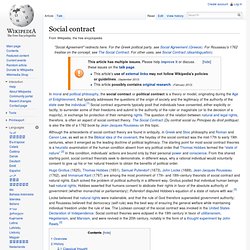
The question of the relation between natural and legal rights, therefore, is often an aspect of social contract theory. The Social Contract (Du contrat social ou Principes du droit politique) is also the title of a 1762 book by Jean-Jacques Rousseau on this topic. Henry David Thoreau. Henry David Thoreau (see name pronunciation; July 12, 1817 – May 6, 1862) was an American author, poet, philosopher, abolitionist, naturalist, tax resister, development critic, surveyor, and historian.
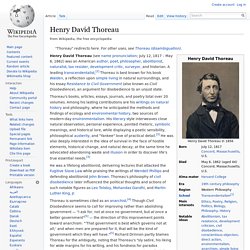
A leading transcendentalist,[2] Thoreau is best known for his book Walden, a reflection upon simple living in natural surroundings, and his essay Resistance to Civil Government (also known as Civil Disobedience), an argument for disobedience to an unjust state. Thoreau's books, articles, essays, journals, and poetry total over 20 volumes. Among his lasting contributions are his writings on natural history and philosophy, where he anticipated the methods and findings of ecology and environmental history, two sources of modern-day environmentalism. Name pronunciation and physical appearance[edit] In appearance he was homely, with a nose that he called "my most prominent feature. Political philosophy.
Jean-Jacques Rousseau. Jean-Jacques Rousseau (/ruːˈsoʊ/;[1] French: [ʒɑ̃ʒak ʁuso]; 28 June 1712 – 2 July 1778) was a Genevan philosopher, writer, and composer of the 18th century.
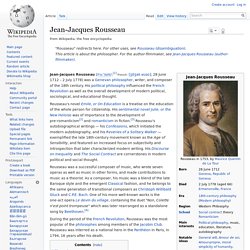
His political philosophy influenced the French Revolution as well as the overall development of modern political, sociological, and educational thought. Biography[edit] Youth[edit] Rousseau was born in Geneva, which was at the time a city-state and a Protestant associate of the Swiss Confederacy. Since 1536, Geneva had been a Huguenot republic and the seat of Calvinism. Rousseau was proud that his family, of the moyen order (or middle-class), had voting rights in the city. Geneva, in theory, was governed democratically by its male voting "citizens".